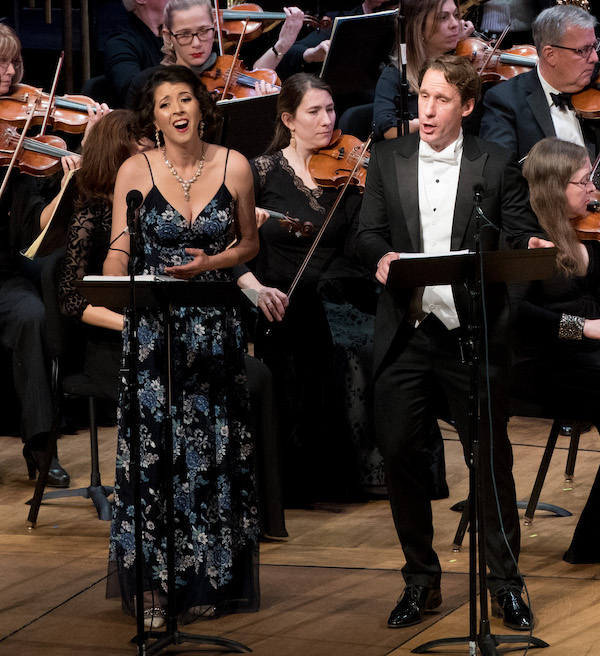WCO’s superlative casting lights a fire amid the gloom of Thomas’s “Hamlet”

Ambroise Thomas’s Hamlet, premiered in Paris in 1868, has not received much air time in the United States. Washington National Opera, for example, gave its first and only production of this beautiful grand opera in 2010. What that staging lacked, an exemplary cast, was on hand for Washington Concert Opera’s second performance of Hamlet Sunday evening, heard in Lisner Auditorium.
Jacques Imbrailo made a superb D.C. debut with Washington Concert Opera in the title role. The South African-born baritone mined his mellifluous voice for a broad range of colors and dynamic shadings in a performance that was alternately forceful and subtle. The drinking song, “Ô vin, dissipe la tristesse,” rollicked with vibrant power, while Hamlet’s mad scene in Act II was as light and airy as Thomas’s orchestration in that scene. The dramatic scope of Imbrailo’s interpretation encompassed both vitriolic rage, in the duet with Gertrude, and melancholy introspection, as in the “To be or not to be” monologue and the love duet with Ophélie.
This was all the more impressive in an opera like Hamlet, since Thomas gave most of the vocal fireworks to Ophélie. Exemplary in this demanding coloratura role was soprano Lisette Oropesa, whose voice seems to grow richer and more refined with each appearance. She has sung the role on stage before, and the sense of a specialist’s knowledge came through from her love duet in Act I and Act II scene onward.
Oropesa’s coloratura exploits, especially in the show-stopping mad scene that encompasses all of Act IV, revealed consummate control and grace. Incendiary high notes floated, chromatic runs slid downward with clarity, and trills glimmered. Particularly convincing were the runs that rocketed upward, ending abruptly as high as the E off the staff, incarnating the character’s mad outbursts.
Delights continued all the way down the cast list. Mezzo-soprano Eve Gigliotti, whom local audiences may remember from her years at Wolf Trap Opera Company in 2010 and 2011, made an outstanding company debut as Gertrude. Her combination of volcanic low notes and assured power into the upper reaches made for an emotional and mercurial queen, riddled with anxiety and guilt over her part in her husband’s death, but still filled with maternal care.
She was matched by the baritone Tom Fox, who took on the bass role of Claudius with a robust and authoritative sound. He displayed the needed brutish quality in the upper range, bullying Gertrude in their opening scene, but a honeyed veneer in the chapel scene (“Je t’implore”) where the sincerity of his prayer, including that concluding E-flat below the staff, created sympathy at the same time.
Tenor Jonas Hacker made a bright, youthful Laërte, with a pleasing ring at the top, while bass Brian Kontes was a stentorian presence as the ghost of Hamlet’s father. Matthew Scollin and Matt Hill were effective as Horatio and Marcellus, and hilarious in the drunken duet of the gravediggers. Timothy Bruno had a brief but excellent turn as Polonius, who is a co-conspirator in the king’s murder in the opera.
Antony Walker presided over a pleasingly varied performance of this beautiful score by his WCO orchestra. The horn solos of the ghost music set a gothic mood, and the brass fanfares, complex and often offstage, signaled courtly ceremony with brilliance and clarity. Solos introduced characters with panache, like the moody cello section for Hamlet, the distracted flute or the ethereal harp and muted violins for Ophélie, as well as a fine saxophone solo in the lead-in to the dumbshow. The ballet music was excised, likely in the interest of time.
The WCO Chorus stumbled a bit over the fast-moving words in their Act I scene, but the evocative humming chorus of the mad scene was subtle and beautiful, as was the funeral chorus of Act V. The massed sound of chorus, orchestra, and this superlative cast, made the dramatic ensemble scenes a triumph.
Washington Concert Opera returns with Verdi’s Simon Boccanegra on April 5, 2019. concertopera.org


